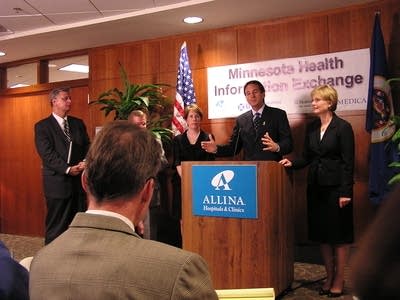Network will link patient records

The Minnesota Health Information Exchange is being billed as an electronic superhighway for medical records, and one of the largest such networks in the nation.
Gov. Tim Pawlenty says the system will make doctor visits easier for patients.
"Imagine a world where you don't have to carry those medical records from one place to another, where you don't have to remember yourself all of your medications, that this is stored electronically. And that your doctor, your provider, your payer can access this in a quick, comprehensive, efficient form," says Pawlenty.
For example, if you're on vacation in northeastern Minnesota and you get sick, Pawlenty says a physician can use the Minnesota Health Information Exchange to see which medications you're using, often in a matter of minutes.
Create a More Connected Minnesota
MPR News is your trusted resource for the news you need. With your support, MPR News brings accessible, courageous journalism and authentic conversation to everyone - free of paywalls and barriers. Your gift makes a difference.
The exchange essentially collects information that is already stored at your health plan, or at other hospitals and clinics that you've used in the past.
Mary Brainerd, the president and CEO of HealthPartners, says the exchange will make health care safer.
"For people who have complex illnesses, they often have five, six, 10 medications they're taking at a time," Brainerd points out. "A very serious risk to your care in the hospital is whether or not the people who are giving your care actually know what medications you're using."
Brainerd says knowing that information quickly could save your life, and likely money, if fewer mistakes are made.
She says the network should help medical providers trim costs by cutting down paperwork, heading off expensive duplicate tests and preventing dangerous drug interactions.
HealthPartners is one of the founders of the exchange, along with Blue Cross Blue Shield of Minnesota, Medica and Allina Hospitals and Clinics. They have been looking at ways to link patient electronic medical records for years, but privacy concerns have slowed their progress.
Colleen Reitan, president and COO of Blue Cross Blue Shield of Minnesota, says it was important to all of the founders to design the exchange without creating a new database of information. She says it was also important to figure out a secure way to identify patients.
"There's some new technology available that allows, with a high degree of confidence, the ability to identify individuals without needing things like Social Security numbers to identify them," Reitan says.
Patients must also give their consent before their medical records can be shared among health providers.
But these safeguards don't appease some privacy advocates.
Twila Brase is with the Citizens' Council on Health Care, and is a longtime critic of electronic medical records.
"Maybe what they're saying is it won't create a new database of clinical data. But it will create a new database of identifiable data on individuals, along with the location of every place that they've been in the health care system, which is a mini ... medical history of every patient," Brase says.
Brase says even though patients must give their consent to use the exchange, Minnesotans had no say about whether they wanted to be a part of the exchange in the first place.
Initially, the Minnesota Health Information Exchange will only transmit information about prescription medications and laboratory service. Eventually, its founders hope to use it to collect other information such as disease surveillance.
The partners in the exchange will put up $4.5 million to get it up and running, and they expect it will be activated by early 2008.
Patients who don't have insurance, or who are insured by plans operated outside of Minnesota, will not be able to access the exchange.
(The Associated Press contributed to this report)
